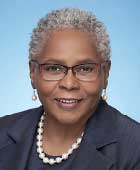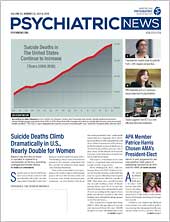When I spoke at the Opening Session of APA’s 2018 Annual Meeting in May, I identified three general areas on which I plan to focus during my presidential term: engage and support trainee and early career psychiatrists, expand APA’s collaborations in the global mental health arena, and expand APA’s efforts in diversity and inclusion throughout the membership. Over the next few months, I will share my thoughts on how I’d like to see more members engaged in each of these areas and what the impact on APA will be.
In this first column of my presidency, I want to start with how we can better engage and support our future psychiatrists. As I said during my speech, I intend to actively engage our resident and fellow members and encourage more “seasoned” members (like myself) to become mentors, starting at the local level, and nurture their ideas for how we can ensure a strong and hopeful future for psychiatry.
Many of them are already involved in our fellowships, components, and governance at the Assembly and Board of Trustee levels. I’ve met so many as I traveled over the past year, however, who don’t see the value in belonging to APA. Even when their residency program pays their dues, many of them aren’t actively engaged and are members in name only.
Also, I want to hear member ideas on how we can encourage the development of innovative outreach efforts to draw young men and women from diverse backgrounds into APA so that APA can develop a sustainable strategy for the future that reflects their needs and voices.
We must welcome our junior members to the frontlines and ask how recent changes are affecting their work and lives and find out the changes in training, professional development, and lifelong learning that we should we consider to show the benefit of working with APA starting in the early years of their career. I hope you will agree that if they are the future, we must extend our outreach efforts to bring them into the work of the organization sooner rather than later.
Another part of my commitment is to explore ways to help our early career colleagues grapple with their excessive educational debt load. We must acknowledge that these and other challenges create the environment for significant levels of stress and burnout in this group. It also affects where and how they choose to practice, and as the professional association for psychiatrists, APA has a responsibility to begin looking at ways to address these challenges if we are to have a future psychiatry that meets the needs of the members and the patients we serve.
Other activities already planned to address this area include expanding the work of the committee addressing physician stress and burnout established by my predecessor, Dr. Anita Everett, to include more resident and early career psychiatrist (ECP) representation. The chair, Dr. Rick Summers, will be seeking volunteers willing to help recruit trainees and ECPs to take the
survey on physician burnout so that we have data to better identify their unique issues and develop solutions to address them. The results of the current study and how all members can get involved in working on this issue are also available on the website.
As APA approaches its 175th birthday, what we all want is a strong APA that can create a positive future and accomplish the shared goals of our more than 37,800 members. Over the next year I hope you’ll be standing beside me as I reflect on our values, mission, and strategic plan and listen to your ideas on how we can best achieve the future we want for psychiatry. Here’s to a great year ahead! ■

